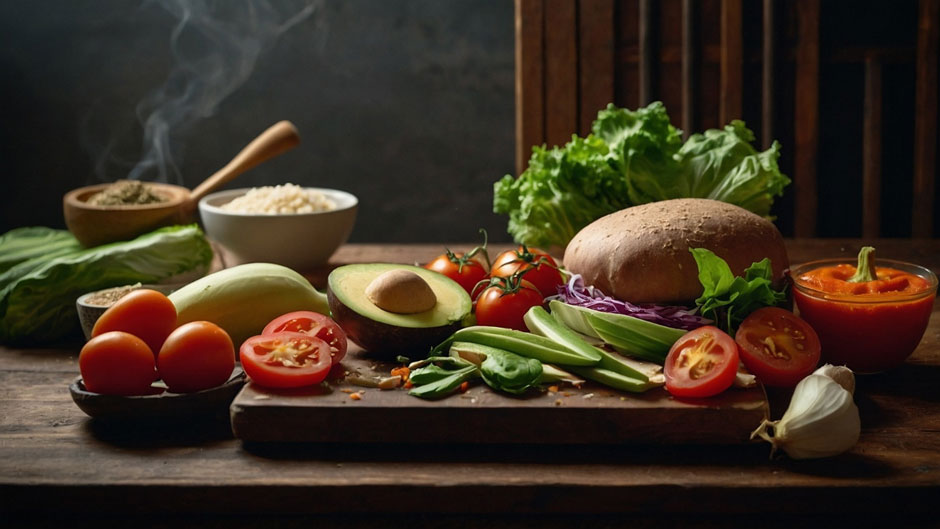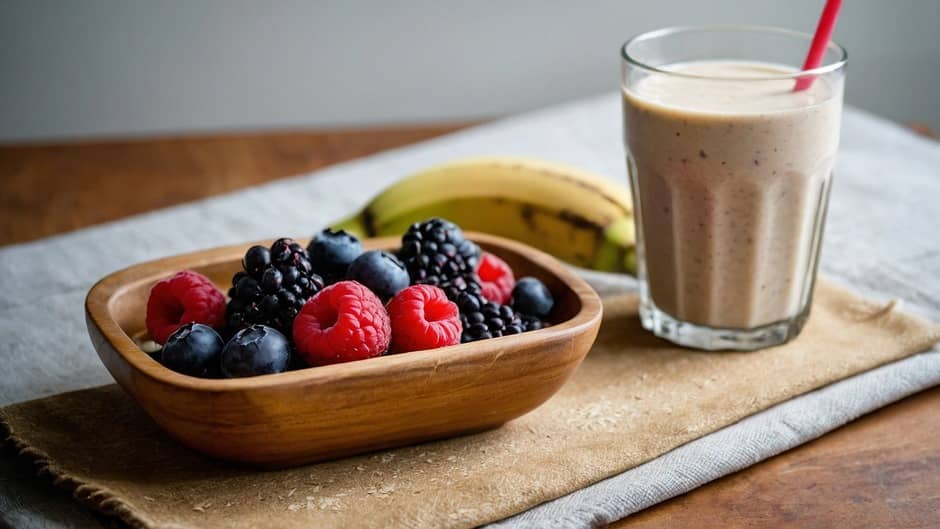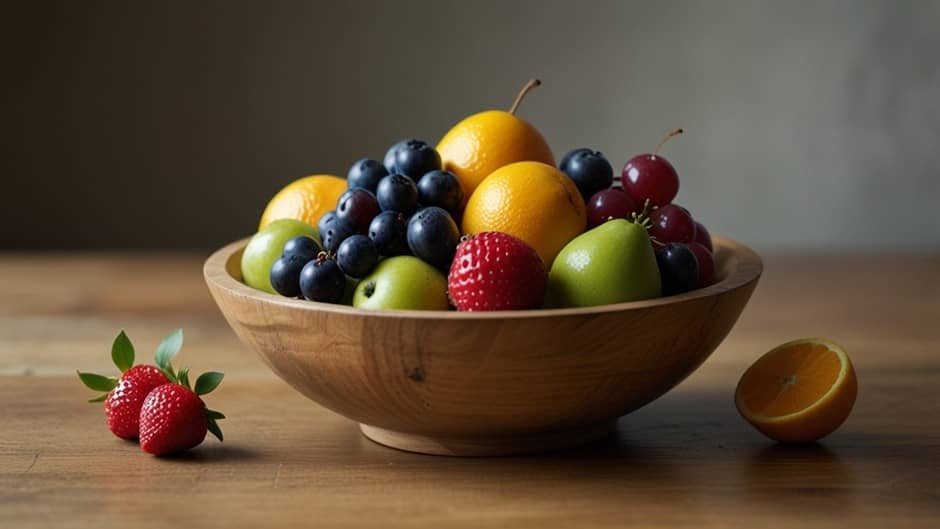Table of Contents
- Why a Balanced Diet Matters?
- The Science Behind It
- How a Balanced Diet Helps with Weight Management?
- Putting It into Practice
- Importance of Drinking Water
- Final Thoughts
Why a Balanced Diet Matters?
First, let’s clarify what precisely makes a healthy diet.
Imagine that you have four sections on your plate: one for whole grains, one for fruits, one for veggies, and one for protein.
Conversely, healthy fats are also appropriate. To maintain a balanced diet, it’s not necessary to cut out entire food groups or stick to the same things every day. It’s all about variety and making sure the supplement blend you’re getting is correct.
I will explain how a good eating habits can help to manage your weight.
Why is this significant for weight management now?
It has been demonstrated that eating a diet rich in whole foods, such as fruits, vegetables, lean meats, and whole grains, increases the chance of keeping a healthy weight.
You won’t eat as much of these foods because they are high in nutrients that keep you content and full.
And let’s be honest, we are less prone to nibble on unhealthy foods when we are full of good stuff.
The Science Behind It
Let’s examine the science a little more closely.
Our bodies are like machines that require the proper fuel to function perfectly.
Eating a well-balanced diet provides our bodies with the nutrients they require to function as best they can.
For example, fiber from whole grains and vegetables promotes a healthy digestive system, reduces the appearance of bloating, and aids in weight management.
Proteins such as those in nuts, beans, and lean meats make up our muscles. Our muscles’ primary areas of strength for survival are when we have enough protein in our diets. This is important for calorie consumption even when we’re not exercising. And those healthy fats?
They do more for us than just provide flavor; they keep our thoughts active and help absorb vitamins.
Conversely, a diet heavy in sugar, processed foods, and bad fats can cause weight gain because they deprive your body of the nutrients it needs to feel satiated and full.
It’s like filling up your car with subpar fuel; it might work, but it won’t run smoothly.
How a Balanced Diet Helps with Weight Management?
When we think about it, it’s simple to fall into the trap of believing that eating less is the key to managing our weight.
But basically, it comes down to eating more wisely.
A well-balanced diet aids in weight control by supplying us with consistent energy levels throughout the day.
When we eat meals that are balanced in terms of carbs, protein, and fat, our blood sugar stays more steady. This implies that we don’t always experience fatigue or hunger.
Moreover, here’s an intriguing fact: eating a variety of foods ensures that our bodies receive all the nutrients and minerals they require.
This actually helps lessen cravings because our systems occasionally crave specific foods when we are lacking in vital nutrients.
For example, if you don’t get enough magnesium, you may find yourself craving chocolate. In the unlikely event that your eating schedule is changed, such cravings are less likely to materialize.
Also Read – Why Shouldn’t You Put Warm Food In The Fridge? – Store Hot Food In Fridge (2024)
Putting It into Practice
How might we give this a try?
It doesn’t have to be challenging. Think on what’s on your plate first.
Do you eat enough fruits, veggies, grains, and proteins? If not, think about making some minor adjustments.
Think about making a second serving of veggies or switching to whole-grain bread instead of white bread for supper. It also helps to plan ahead.
When you schedule your meals and snacks, you’re less likely to grab something unlucky on the spur of the moment. Remember that the majority of the time, making better selections is more essential than being flawless.
It is okay for each of us to treat ourselves once in a while on certain days.
We must correct course and keep pursuing a more balanced situation.
Alright, let’s start with a topic that may sound basic but is crucial: maintaining proper hydration.
The old saying, “Drink eight glasses of water a day,” is probably familiar to all of you. But have you ever thought about why? What function does water actually serve in our bodies, and how might it fit into a balanced diet? First, let’s start with the basics.
Water is truly the essence of life. Each and every cell in our bodies needs water to function properly.
Our bodies utilize water for practically everything, even things you may not be aware of.
It’s like that underappreciated, very amazing person in our daily lives. Conversely, hydration is a crucial part of a diet that is well-balanced. We should divide it in this manner.
I want to discuss six major uses of water that our bodies make. And believe me, some of these may surprise you.

Importance of Drinking Water
1. Regulating Body Temperature
First, let’s discuss how water aids in controlling our body temperature. Envision yourself enjoying the weather or going for a run on a hot day.
Are you starting to perspire?
That’s the way your body naturally cools itself.
In reality, though, heat is transferred when water formed from perspiration evaporates from your skin. It looks like your own cooling system. But this system won’t function as well if you don’t drink enough water, and you may even start to feel faint and overheated.
Staying hydrated makes it easier for your body to withstand heat, particularly during an exercise session or in hot weather.
2. Supporting Digestion and Nutrient Absorption
Next, let’s discuss digestion. You know how your stomach feels after eating a lot and it begins to work harder?
Water, however, has a big influence on that process. It helps your body break down meals so that it can absorb nutrients. Think of water as your body’s culinary helper, making sure everything functions properly.
Bloating and constipation are signs of digestive issues brought on by dehydration.
Additionally, if your body is not able to absorb nutrients efficiently, even the best foods won’t give you the benefits you need.
3. Lubricating Joints
Have you ever heard or felt a pop in your joints?
That typically doesn’t lead to any issues, but did you know that drinking water helps maintain the health of your joints?
A slick material called synovial fluid makes joints glide more easily and lowers internal friction. The main component of this fluid is water. Therefore, when you drink adequate water, your joints are better protected against deterioration.
This is particularly crucial if you are active or getting older, as it helps avoid stiffness and pain.
4. Flushing Out Toxins
Let’s move on to a topic that is common to all of us but may not have received much attention: disposing of waste.
Consider what helps your body sort through toxins and waste products, which it does constantly.
Aqua.
Urine is the byproduct of your kidneys’ use of water to filter waste from your blood. If you don’t drink enough water, your kidneys have a tougher time functioning properly, which can lead to issues like kidney stones.
Thus, getting enough water into your system is one of the simplest ways to aid in your body’s natural detoxification process.
Also Read – How Do You Treat Joint Pain? – Sharp Pain In Knee After Exercise (2024)
5. Transporting Nutrients and Oxygen
It’s amazing how water functions similarly to your body’s transportation system. Given that your blood is 90% water, it aids in the delivery of nutrients and oxygen to every cell in your body.
Think about this: the vitamins, minerals, and other nutrients you eat must pass through your digestive system and reach the parts of your body that require them the most each time you eat.
That’s made possible by water.
If you don’t drink enough water, your body’s transport system becomes less effective, and it may not receive the necessary nutrients to function at its best.
6. Maintaining Skin Health
Finally, but just as importantly, let’s talk about something that concerns us all: our skin.
I all, who doesn’t desire clear, healthy-looking skin? Yes, water is beneficial to the skin.
If you drink enough water, your skin will remain hydrated from the inside out. It can even help to make wrinkles less noticeable and make your skin look more radiant. Conversely, dehydration can make your skin appear parched and exhausted.
If you want that natural glow, keep in mind that drinking water is just as crucial as adhering to a beauty routine.
Final Thoughts
That’s pretty much it – the six main explanations for why being hydrated is so important for our health.
Maintaining a healthy physique from head to toe is just as vital as consuming adequate water.
Water is essential for all bodily functions, including temperature regulation, digestive support, joint cushioning, toxin removal, nutrient transportation, and skin health.
Read us on Medium.




